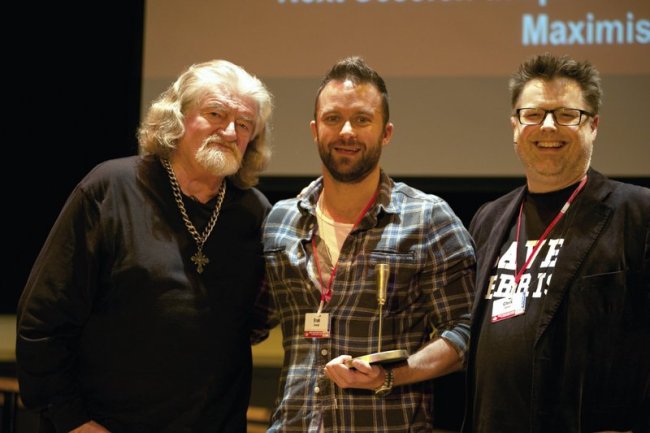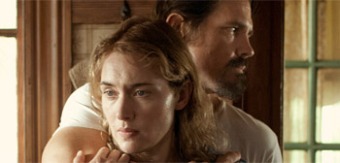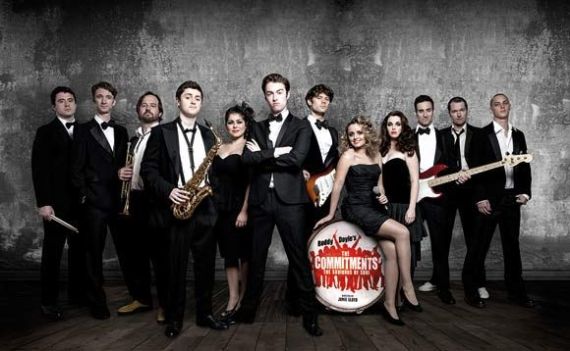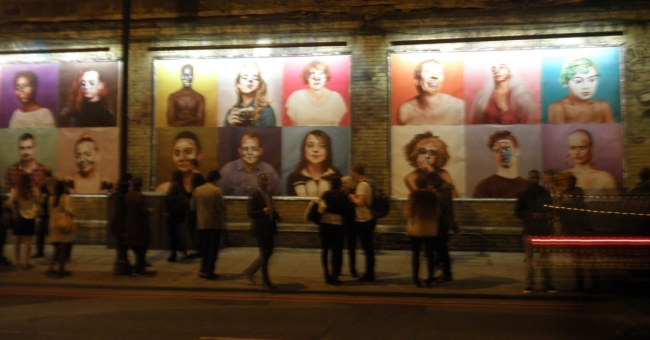I like Basic Instinct. It’s smart, it’s sexy, it twists and turns but does not insult the audience’s intelligence, and the performances are spot-on. I put it on the cover of Time Out, a few months after I became Editor.
It was the most talked-about movie of 1992, and took $350 million worldwide. Joe Eszterhas himself was paid a then record $3m for his spec script after a frantic auction – just 13 days after he first sat down to write it.
Joe tells us how the film got made – and how it very nearly didn’t – in my second daily dose of his movie masterclass from the London Screenwriters’ Festival:
Let your characters live. “Writing starts with characters. When it’s going well, the characters tell me what to do – within certain boundaries, or you lose the spine of the story. I’d wake at 3am and take notes.”
Keep it real: “It took 13 days to write, but I had thought about it for a decade. It started with a policeman I knew. He was a great guy but he’d been involved in three fatal shootings, and I decided that he liked it. Then I thought of this woman smart enough to manipulate him.”
[Eszterhas also based this woman, played in the film by Sharon Stone, on a real person. He didn’t say this at the London Film Festival – perhaps because his 15-year-old son was in the audience – but he tells the story in his gloriously indiscreet book The Devil’s Guide to Hollywood:]
“One night when I was a young man, I was with a girl I’d picked up at a go-go bar in Dayton, Ohio. She was one of the dancers. We went to a hotel and, after what we’d done what we went there to do, she pulled a cute little .22-calibre revolver on me and asked if I had any real good reason why she shouldn’t pull the trigger, considering the way her life was going and considering how used she felt at that moment. She told me I wouldn’t be the first guy she’d pulled the trigger on, and I believed her… and somehow talked her out of pulling it on me. When I was writing Basic Instinct many years later in a little room in my house in San Rafael, California, I remembered the girl in that hotel room in Dayton, Ohio.”
For God’s sake, pick a title that suits the genre: “It was originally called The Love Birds, after a Country & Western song I loved. I was about to send it to my agent, when I suddenly stopped, in a grittier version of Paul on the road to Damascus, and the words ‘Basic Instinct’ came into my head. I turned around and changed it.”
Include at least one scene that everyone will still talk about 20 years later: “The flashing scene was not in the original script, that was all Paul (Verhoeven). There was a scene where Michael watches Catherine change, and she’s nude, and you see she’s not wearing underwear. Paul in his mad genius Dutchman way took that scene over into the interrogation scene, flashing ‘those little bitty hairs’, as he called them.”
You may have to fight for what’s right. “Paul wanted to change the Basic Instinct script. We had a big meeting, including the producer, Irwin Winkler, and Michael Douglas, the star. Michael was leading the fight, feeling that Catherine was one-upping his character all the time, and that there was no redemption, and he wanted the movie to end with him shooting and killing her. Paul backed him up. I said if you want to do this I won’t be involved in killing my own child. It would make it into a bad TV movie. In my mind, this was film noir, not a morality tale, and that’s what made it unique and daring.
“Paul stood up and said, ‘I am the director, you are the writer, you do what I tell you.’ I said ‘Like f*** you do!’ Irwin Winkler called Paul ‘a f***ing Nazi’. And that was the end of a great creative session!
“Three months later I get a call from Paul, who’s decided to go back to my original draft. He said he hadn’t understood the ‘basement’ of my script, as he called it, that it was about good and evil. He not only went back to my draft, he actually held a press conference and said this. For a director to mumble these words is quite something; for him to hold a press conference is mind-boggling.”
Read the first part of Joe’s wit ‘n’ wisdom here. Joe Eszterhas’s scene by scene commentary on Basic Instinct is now up here.











LSF #4: Basic Instinct, blow by “blow”, with Joe Eszterhas
31 OctModerator Chris Jones (left) and Joe Eszterhas giving live commentary on Basic Instinct
At the London Screenwriters’ Festival on Sunday, there was a full screening of Basic Instinct. Its writer, Joe Eszterhas, gave a live commentary from the stage, moderated by the festival’s creative director, Chris Jones. Thriller expert Lucy V Hay was also on the panel, but Joe blanked every single one of her questions – “Listen, I just type this stuff”, he said at one point, evidently no fan of critical analysis.
Eszterhas’s wife Naomi and their 15-year-old son were in the audience, which made watching the very graphic sex scenes even more surreal, particularly when you remember that Eszterhas claims to have had a fling with Sharon Stone, preserved here in her prime, at the time of Basic Instinct.
So come, Watch With Joe. I’ve recorded the best of the in-flight commentary for your benefit, so fasten your seatbelts: it’s going to be a bumpy night.
George Dzundza comes up on the credits. Joe: “My suggestion for this part was Willie Nelson. That’s how much I know about casting.”
Jerry Goldsmith’s score plays. Joe: “I kept hearing Stones songs while I was writing Basic Instinct. We actually bought the rights to Sympathy for the Devil for $700,000 to use over the closing credits, but Paul (Verhoeven) elected not to use it.”
The very first scene is full-throttle love-making with some white-scarf bondage thrown in. Chris: “We’re already straight into the action.” Joe: “The ‘business’, as we say in Hollywood.”
Suddenly, the woman frenziedly stabs the man again and again with an icepick. Chris: “Holy shit, Joe!” Joe (shrugs, deadpan): “She was excited.”
Roxie is introduced. “I’m her friend,” she tells detective Nick Curran. Chris: “That’s so charged, the way she says it.” Joe: “Camille Paglia [influential feminist commentator] praised the film for its modern take on sexual politics.”
The first scene between Dr Beth Garner (Jeanne Tripplehorn), a psychiatrist, and Nick Curran. Chris: “Great sexual charisma between her and Michael Douglas.” Joe: “It doesn’t hurt that they were having a blazing affair while filming.”
Nick watches Catherine Tramell (Sharon Stone) undressing. Chris: “That’s very inappropriate behaviour. It tells us something about his character.” Joe: “He likes to get too close to the flame.”
Catherine Tramell offers Nick a cigarette even though he’s given up, lights one, smokes it suggestively. Joe: “There is no doubt that these scenes glamorise smoking. Especially with Sharon doing it. I regret that, especially in the light of what happened to me later [Eszterhas contracted throat cancer in 2001; his husky voice is due to the removal of most of his larynx].”
The notorious interrogation scene. This was Verhoeven’s idea, inspired by a woman who uncrossed her legs, pantieless, at a party to embarrass him when he was younger. Joe: “Close your eyes, John! [This to his 15-year-old son in the audience.] This is a terrific scene but the downside is that this is, in my mind, a really intricate film noir, but it’s rather overshadowed by the world’s most famous pussy shot. It may have done Sharon a disservice, too. She does seem really fine, subtle performing here.”
A passionate sex scene between Dr Garner and Nick Curran turns violent. Joe: “This attracted a lot of criticism, but I think it’s obvious that it isn’t date rape in the context of their relationship.”
Um… really? “No!” says Dr Garner, as Curran bends her over an armchair. “Stop!” she says, as he rips off her black panties and thrusts himself into her from behind. Chris: “Blimey!” Joe (drily): “‘Blimey’ indeed.”
After a terrific chase scene down a winding road which Eszterhas intended as a visual echo of the twisting plot, Curran tracks Tramell to the house of Hazel Dobkins, a former killer. Joe: “Hazel Dobkins was an old landlady of mine when I went to College.” Chris: “Did she mind?” Joe: “She sent a note thanking me.”
A great line: Tramell says to Curran, “Soon I’ll know you better than you know yourself.” Curran replies, “I doubt that. I’m very –” “Unpredictable?” she says, in unison with him. Chris: “So who is the killer, Joe?” [He asks that again and again. I hadn’t realised there was any doubt.] Joe: “The usual thing is for me to say buy the DVD and watch it several times, because I still get the residuals! But maybe I’ll tell you at the end.”
A sex scene between Curran and Tramell ends with her tying him down with a white scarf, just as in the murder scene at the beginning. He lets her do it, even though he knows she may be the killer. Chris: “Why?” Joe: “He likes getting close to the flame. And Catherine likes to take him there.”
Over the end of the movie, Joe Estzerhas talks about the bidding frenzy over his script, which was bought by Carolco for a record $3m. “Screenwriters never made that kind of money. I was on holiday with my family at the time, and news teams helicoptered in to talk to me. After it was released, Mario Kassar, the head of Carolco, called me in and said ‘Joey, I paid you peanuts. I’m going to make a hundred million dollars for this f***ing movie.’”
Curran and Tramell make love, Tramell’s hands occasionally going under the bed as though about to pick something up. When Curran agrees they don’t have to “raise rugrats”, just “f*** like minks and live happily ever after”, she leaves whatever it is alone and kisses him. There’s a fade to black, then, unusually, a fade up again… on the icepick under the bed. Chris: “Why the fade to black?” Joe: “I didn’t want to pan to it at that point. When the fade happens a lot of people are going to think she didn’t do it. Then when it fades back…” Chris: “So who really is the killer?” Joe: “She is wonderful, and manipulative, and so smart, and omni-sexual…” [Effectively confirming Tramell as the killer. So there, conspiracy theorists.]
And that’s all for now, folks! Come back tomorrow for Joe Eszterhas on Showgirls and other films. For part 1 of his wit ‘n’ wisdom, click here. For part 2 on the origins of Basic Instinct, including fighting Michael Douglas’s alternative ending, click here. Thanks to screenmusings.org for the screengrabs.
Tags: Basic Instinct, Chris Jones, entertainment, film, Jeanne Tripplehorn, Joe Eszterhas, london screenwriters festival, love commentary, Michael Douglas, movies